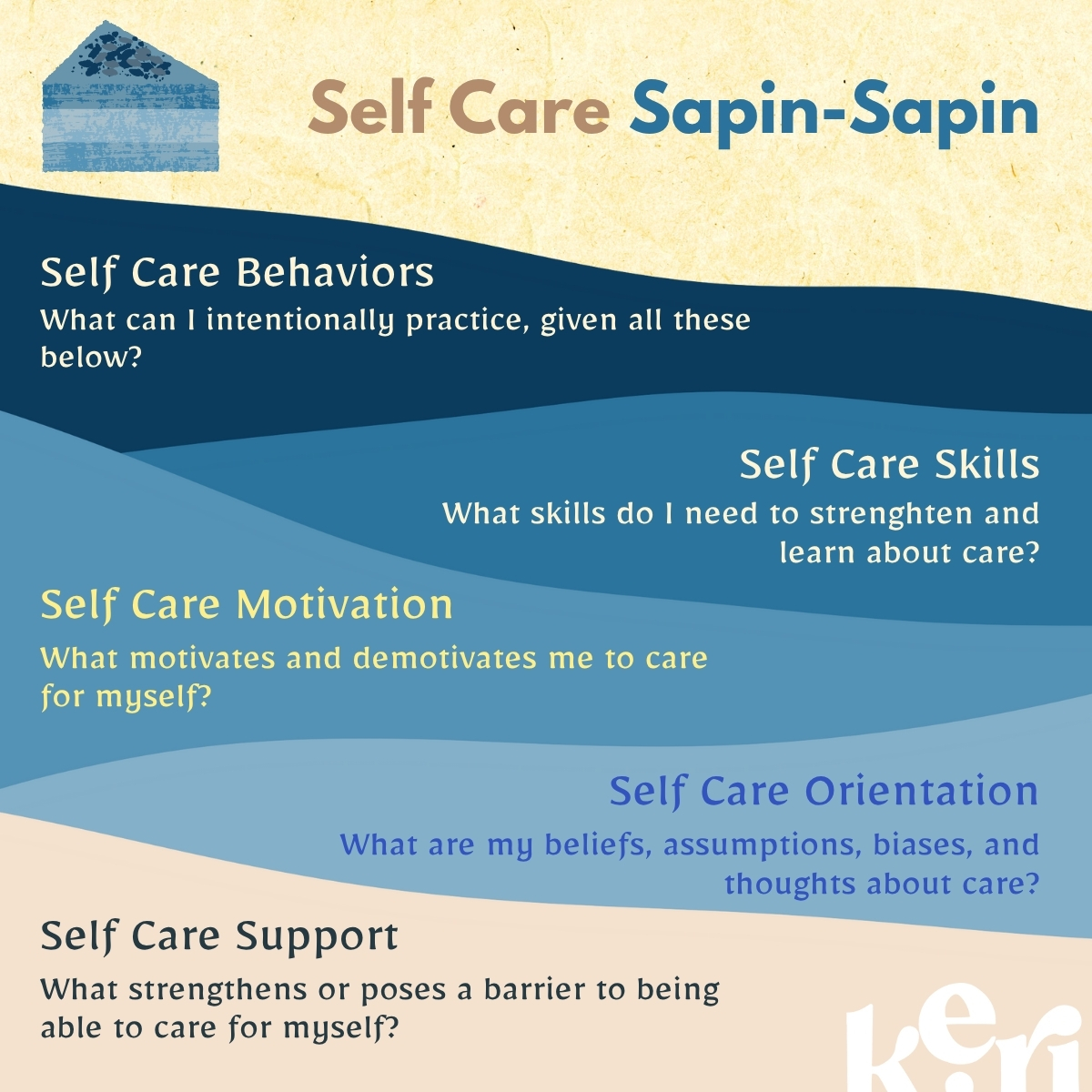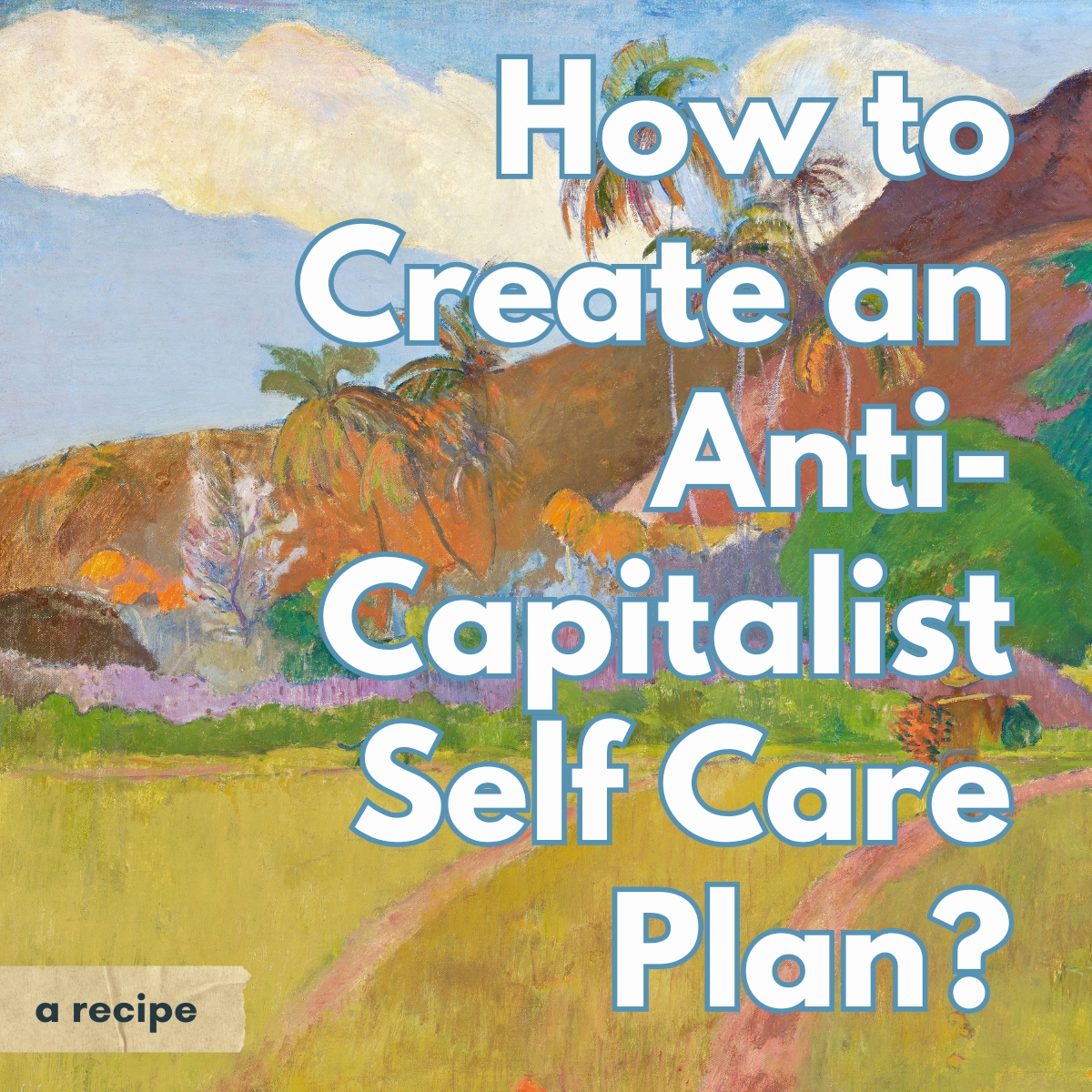
My Anti-Capitalist Self Care Plan
Goal:
To create a self care plan that is anchored in our Kapwa or Filipino collectivist spirit, that resists capitalism, imperialism, and colonization.
With this in mind, we encourage you to root your self care plan in your own language, your own cultural healing traditions and understanding. This can simply serve as a template or guide.
Time:
This may take 30 - 60 minutes. Making more time would be wonderful.
What is the problem with 'Industrialization' of Self Care?
The self care industry promotes self care ideologies, practices, and even spirituality, to help the individual adapt and feel better in a dehumanizing oppressive socioeconomic system that is unlikely to change, rather than promoting resistance and the desire to change the oppressive systems that cause ill-health and unhappiness”
The dominant view of self care asks people to adapt to a ruthless capitalist system rather than challenge it. Self care becomes a tool for people to adapt to a neoliberal world with increasing inequity, declining labor conditions, & lower wages.
How Self Care has been transformed into a business and commodity?
One of the most common statements we've heard from defenders, "-kung di ko yun ginagawa, ano na lang kaya nangyari sakin? (If I didn't do those [self care practices], I wonder how I would've ended up?]".
Instead of practices that nourish our being with the world, self-care has become a way to survive the daily struggles created and maintained by poor governance, corruption, and corporate greed. Self care has evolved into a tool for profit, controlled by and supporting neoliberal economic policy.
In many ways, capitalism pathologizes employees and people by blaming their feelings of suffering, claiming they can be ‘fixed’ using wellness practices.
For example, the responsibility of underpaid, overwhelmed employees in exploitive workplaces to 'recover’ from burnout by "taking better care for themselves". People are taught how to get used to tolerating injustice and oppression, while industries earn from people's limited ways of coping.
Instead of creating safer environments at work, implementing Occupation Safety and Health fully, or providing living wages so that they people can access healthier food and have less time stressing about paying bills, they are blamed and viewed as irresponsible for failing to function.
Advertising and big tech also create narratives that glorify "sacrifice" without addressing basic human needs, while endlessly suggesting solutions. From social media to billboards, they offer products marketed as "self care" or even solutions to trauma or "healing one's inner child". These products fill in the shortcomings of the society, and so are temporary sources of relief, soothing, or comfort.
Why is it important to ‘decolonize’ our Self Care?
Colonialism describes a relationship in which a nation extracts and steals resources, land, or people to become dominant and that this relationship leaves impressions on every aspect of our lives: including how we relate to, experience, and express ourselves. The power of the colonial legacy can lead us to believe that our current reality is the only one possible. (As a thought exercise, what would a world without capitalism even look like?)
Self care is shaped and informed by coloniality. A decolonial approach requires delinking self care from the expectation of maintaining production or being more ‘productive’. Self care should not be limited to a survival response to exploitation and overextension.
Self care should move beyond a list of sanitized and authorized actions to an internal and community-based awareness of and attunement to personal needs, values, and culture that can guide individuals and communities towards wellness and radical healing.
A decolonial approach uses self-care to develop a “conscious and sober assessment of everyday reality”, so that imagining and working towards better alternative realities become possible.
Step 1
Take time to reflect and answer these questions. Every question is important. Kindly sit with these, observe yourself, be truthful without being judgmental. It is very easy for self care to be co-opted, weaponized, commodified, and commercialized by capitalism to sedate us from resistance or to prevent us from addressing structural causes of suffering and pain.
☐ Who and what is my self care for?
☐ What does my self-care allow me to do beyond my survival?
☐ What do I want to do with a healthy body, mind, and spirit?
☐ Why does doing self-care feel so difficult?
☐ Why do I feel guilt when caring for myself?
☐ Where did the idea that I should have to choose between myself and my community come from?
☐ Who does this choice benefit and who does it harm?
☐ How is my self care shaped and influenced by my community?
☐ How is my self care connected to the self care of others and my ability to be in, with, and for my community?
☐ How does my self care help and sustain my community?
☐ How might my self-care reinforce capitalist and colonial values of work and exploitation?
Step 2
Use the following brief Self Care Sapin-Sapin Recipe to help map your existing beliefs and ideas about Self Care. Then, explore the Ginhawa (Wellbeing) activity sheet, a word document that you can fill in.
Give yourself at least 15 minutes to sit and write down existing practices or activities that you do that helps your Ginhawa (wellbeing), such as those that give you Gaan (lightness), Gana (energy/motivation), Sarap (pleasure), Ligaya (joy), and Sigla (vitality).

Step 3
Take a look at the Self Care Sapin Sapin and Ginhawa Self Care Plan, and reflect on the following questions or look back at the questions in Step 1.
☐ Do your existing Self Care practices allow you to be more engaged with the community around you? Do they strengthen you towards creating ginhawa (wellbeing) for others beyond yourself and your family?
☐ Where did your Self Care practices come from? For those that are rooted in the cultural practices of other people (ex. Yoga, meditative traditions), how do you honor and acknowledge them? How can you stand against cultural appropriation and/or the further colonization of their practices?
☐ What can you do to make this Self Care Plan more accessible to you socially, financially, emotionally?
Step 4
Recognize that it may take time to nurture or nourish these practices. It is important to be intentional in practicing them. Set time and goals. Try to be consistent for a day, then a week, then a month, then a year. It's okay if it's not too smooth.
When do I know that my Self Care is “working”?
Know what the Self Care practice is meant for, is it to help nourish your body, your community? Are they intended to calm you so that you can understand your emotions more and act on them?
You can also take time to notice any changes in your body, such as whether you're breathing more slowly, your heart rate is slower, there are less physical pain and discomfort.
Notice whether your thoughts are flowing with more calm and control, that you're able to take focus, think critically, and concentrate better.
Remember that Kapwa (Self+Community) Care practices may not necessarily lead to immediate comfort or relief. Unlike fast remedies, such as gratifying our inner child's “cravings” through retail therapy, a more liberatory or freeing care practice will need time. We need to slowly take back our bodies from the social conditioning of consumption. It may also be uncomfortable at the beginning. Our nervous systems have long been a "target" of capitalism and have gotten used to instant and immediate relief.
It is uncomfortable because we're altering our routines, altering our bodies, and trying something new. Remember that radical and revolutionary love demands effort. Make the effort, be kind to yourself when encountering difficulty, and believe you have in your self, your community, your environment all you need for self-preservation and resilience. It may not necessarily look like a complete elimination of consumption, instead, it's an expansion of the ways we receive, feel, and give care to ourselves and the people around us, who are also, part of us.
References
Comas-Diaz, et. al. (2019). Decolonial Psychology. Some blocks of text above are direct quotes from this meaningful book.





